Understanding Unfair Contract Terms
Unfair contract terms can significantly affect your rights and obligations in any agreement, particularly within the insurance industry.
It is essential to recognize the characteristics of such terms and how they interact with contract law and public policy.
Definition and Principles
An unfair contract term is often one that creates a substantial imbalance between your rights and those of another party.
This imbalance can arise from the nature of the contract itself, especially in standard form contracts where terms are often non-negotiable.
For instance, if an insurance policy requires you to pay excessive fees under specific conditions that are not communicated clearly, that may constitute an unfair term.
Key concepts include:
- Unconscionability: When a term is so unjust that it shocks the conscience.
- Duress and Undue Influence: Pressure tactics that can invalidate your consent to the agreement.
Contract Law Fundamentals
Contract law revolves around the principle that agreements must be fair and just.
In the context of consumer contracts, especially in the insurance sector, legislative frameworks exist to protect you from unfair terms.
Consumer protection laws empower courts to evaluate the fairness of contract terms, particularly regarding disclosure and transparency.
Framework includes:
- Legal stipulations requiring clarity in terms and conditions.
- Rights to challenge vague or misleading contract clauses.
Understanding these legal parameters can help you identify potentially unfair terms in your insurance contracts.
Role of Public Policy
Public policy plays a crucial role in shaping laws against unfair contract terms.
The aim is to ensure fairness and protect consumers from exploitative practices.
In insurance contracts, policies should prioritize consumer well-being over the profit motives of providers.
Legislation often reflects societal values about fairness and equity, seeking to abolish terms considered contrary to public interest.
This includes:
- Regulations that prevent insurers from including overly broad exclusions.
- Provisions that mandate clear communication of rights.
Consequences of Unfair Terms
When a court identifies an unfair contract term, various consequences can arise.
Such terms may be rendered unenforceable or void.
For you, this means that certain stipulations can be challenged, potentially leading to a more favorable outcome in disputes.
Common repercussions include:
- Breach of Contract: Lack of enforceability can lead to litigation.
- Consumer Rights Protection: Increased rights to claim remedies, such as compensation.
Assessment and Enforcement

Understanding the assessment and enforcement of unfair contract terms is crucial for ensuring consumer rights in various sectors, including the insurance industry.
This section delves into the legal criteria for unfairness, relevant legislation, regulatory authorities, and dispute resolution mechanisms.
Legal Criteria for Unfairness
To determine if a contract term is unfair, several legal criteria must be applied.
An unfair term creates a significant imbalance between the parties’ rights and obligations to the detriment of consumers.
You should evaluate whether the term is transparent and comprehendible.
The assessment also considers whether the term is contrary to the requirements of good faith, potentially disadvantaging consumers.
Courts look for proof of misrepresentation or fraud during the contract formation.
If an insurance policy includes terms that disproportionately favor the insurer, you may question the enforceability of those terms.
Consumer Rights Act 2015
The Consumer Rights Act 2015 plays a pivotal role in protecting consumers.
It specifically addresses unfair contract terms in consumer contracts, requiring terms to be fair and transparent.
If a term fails to meet these criteria, it may be deemed unenforceable.
You should pay attention to clauses that limit your rights, such as those restricting your ability to claim compensation for unfair practices.
The Act empowers consumers to challenge unfair terms, providing avenues for recourse.
Familiarizing yourself with the Act can significantly bolster your understanding of your rights in the insurance context.
Regulatory Authorities
Multiple regulatory bodies are tasked with enforcing consumer rights regarding unfair contract terms.
In the insurance sector, the Financial Conduct Authority (FCA) oversees the fairness of contracts.
They focus on preventing market abuses and maintaining consumer protection standards.
Besides the FCA, entities like the Federal Trade Commission (FTC) also address unfair practices, especially concerning business-to-consumer transactions.
You can seek guidance from these authorities if you suspect your insurance provider is using unfair terms.
Compliance with state law is also scrutinized, ensuring consistency across various jurisdictions.
Dispute Resolution Mechanisms
When facing unfair contract terms, it is essential to know the available dispute resolution mechanisms.
Many insurance companies offer internal complaint processes, allowing you to address grievances directly.
If unresolved, external dispute resolution schemes can mediate conflicts.
These mechanisms are usually cost-effective and quicker than litigation.
For specific industries, like financial services, the Australian Securities and Investments Commission (ASIC) also provides guidelines on engaging with such schemes.
You can leverage these resources to advocate for your rights effectively.
Addressing Power Imbalance

In the context of unfair contract terms, power dynamics play a crucial role.
Understanding these dynamics will help you navigate contracts more effectively and protect your interests, especially if you’re a consumer or a small business owner.
Understanding Power Dynamics
Power dynamics in contracts often reflect the relationship between the parties involved.
When one party possesses significantly greater resources or market influence, such as a large insurer, they may impose terms that are not favorable to you.
This can manifest through unfair contract terms that may limit your rights or responsibilities, such as excessive fees or restrictive clauses.
Recognizing these disparities allows you to critically evaluate whether the terms are equitable.
It’s essential to consider how duress or undue influence might affect your decision-making under pressure from a more powerful party.
Avoiding Unfair Bargaining
When entering into a contract, especially in the insurance industry, it’s important to protect yourself from unfair bargaining practices.
Always seek clear, transparent terms before agreeing.
Review contracts thoroughly, looking for fine print that might hide important clauses.
If anything seems unclear or overly complex, consider seeking legal advice.
Engage in discussions that allow you to voice your concerns about specific terms.
This helps to not only clarify the conditions but also resists the pressure from the other party.
Legal Recourse for Consumers
If you find yourself facing an unfair contract term, you should know that legal recourse is available.
Under various state laws, you can dispute certain terms that disproportionately favor the other party due to an imbalance of power.
Utilizing a dispute resolution scheme outlined in consumer contracts can also serve as an effective means to challenge unfair terms.
Document your experiences, gather evidence, and consult with a professional for guidance on how to present your case effectively.
Protective Measures for Small Businesses
If you’re a small business owner, being proactive is crucial.
To counteract potential abuses, prioritize drafting contracts that emphasize mutual benefit.
Incorporate terms that outline clear procedures for contract modifications or disputes.
This keeps the balance of power in check and protects your rights.
Consider joining alliances or groups that can provide resources or collective bargaining power.
This strategy can help level the playing field when negotiating terms with larger corporations.
Contractual Dynamics and Remedies

Understanding contractual dynamics, particularly when dealing with unfair contract terms, helps you navigate the complexities of agreements within the insurance industry.
It’s essential to know how contracts are formed, how to challenge unjust terms, and what remedies are available when disputes arise.
Valid Contract Formation
To establish a valid contract, certain elements must be present: intention, consideration, and capacity to contract.
Intention refers to both parties’ desire to create a binding agreement.
Consideration involves something of value exchanged, which is crucial for enforcing the contract.
In consumer insurance contracts, these elements serve to protect your interests.
For instance, if you are misled about the terms of coverage, this may indicate a lack of genuine intention from the insurer.
Ensuring that all criteria for a valid contract are met establishes a strong foundation for legal recourse if needed.
Challenging Contract Terms
You can challenge unfair contract terms if they are unjust or unconscionable.
Unconscionability applies when a contract is overwhelmingly one-sided, leading to an unfair advantage for one party.
This often occurs in situations where complex insurance products are sold to consumers without adequate explanation.
In such cases, it is critical to identify the specific terms that may be considered unfair.
These might include excessively high penalties for early termination or ambiguous definitions of coverage.
Your ability to challenge these terms can significantly influence the outcome of a dispute and affect your rights.
Available Legal Remedies
When you encounter unfair contractual terms, various legal remedies may be available.
Rescission is one option, allowing you to void the contract and restore both parties to their pre-contractual state.
This can be vital when misrepresentation or coercion occurs.
Monetary damages are also an avenue for recovery if a breach results from unfair terms.
You may claim for direct damages, which cover immediate losses, as well as consequential damages, which relate to losses incurred as a result of the breach.
Understanding these remedies empowers you to seek justice effectively.
Uniform Commercial Code (UCC)
The Uniform Commercial Code (UCC) plays a significant role in regulating commercial transactions, including contracts in the insurance sector.
This set of laws standardizes contract practices and provides guidelines for terms that may be deemed unfair.
Under the UCC, you can challenge certain terms, especially those involving performance obligations and limitations.
For instance, if an insurance contract includes clauses that restrict your rights excessively, the UCC may provide grounds for a legal challenge.
Familiarizing yourself with these regulations can help you better protect your rights in contractual arrangements.
Frequently Asked Questions

Understanding unfair contract terms is crucial for navigating your rights in both consumer and business contexts.
Specific scenarios and legislation can help in identifying and challenging unfair contract clauses, particularly in the insurance industry.
What constitutes an unfair term in a consumer contract?
An unfair term in a consumer contract can create a significant imbalance between the parties’ rights and obligations.
It often lacks transparency, meaning you may not fully understand the implications.
Common examples include excessively high fees, unilateral changes to the contract, or terms that limit your legal rights.
In which situations can a small business challenge a term as being unfair?
Small businesses can challenge an unfair term when it creates an unequal bargaining position.
If you find that a contract forces you into unfavorable conditions without negotiating options, you may have grounds to dispute it.
This is especially true for standard form contracts where terms are imposed without negotiation.
What are the legal penalties for including unfair terms in contracts?
Legal repercussions for incorporating unfair terms vary by jurisdiction but can include invalidation of the unfair clause.
In some cases, you may seek damages or have an opportunity to renegotiate the terms.
Regulatory authorities may also impose fines on businesses that deliberately exploit unfair contract provisions.
How does recent legislation affect the assessment of contract fairness between businesses?
Recent legislation aims to ensure greater fairness in contractual agreements, especially in the insurance sector.
These laws may require clearer disclosures of terms and a more balanced approach to contract negotiation.
If terms are found unfair, they may be declared void, promoting fairer practices.
What rights do consumers have when faced with unfair terms in standard form contracts?
As a consumer, you have the right to challenge any term you deem unfair.
You can report such terms to regulatory authorities and potentially seek legal recourse.
Many jurisdictions also support consumers with protections against terms that substantially disadvantage you without just cause.
How has the Unfair Contract Terms Act been amended to better protect consumers and small businesses?
Amendments to the Unfair Contract Terms Act have enhanced protections for consumers and small businesses.
These changes often emphasize clearer definitions of fairness and promote a greater duty of care in contract drafting.
Now, enhanced scrutiny of standard terms is commonplace to prevent exploitation.






